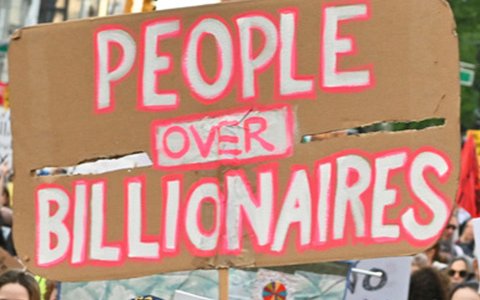What billionaires and giant corporations pay in taxes—and what that means for the rest of us.
“We can either have democracy in this country, or we can have great wealth concentrated in the hands of a few," famously said former U.S. Supreme Court Justice Louis Brandeis. "But we can’t have both."
At Oxfam, we’ve been tracking the global rise in corporate power and billionaire wealth. With the number of billionaires now topping 3,000 for the first time—and the passage of last year’s tax cuts in the U.S. for the ultra-rich and mega-corporations—it's an important time to understand whether the rich pay their fair share.
So we’re going to answer these questions, step by step: Do billionaires and giant corporations pay their fair share? How have President Trump’s policies affected what they pay in taxes? And what would the rich paying their fair share mean for something as ambitious as ending poverty and injustice?
Do billionaires pay their fair share?
Billionaires in the U.S. often pay a lower tax rate than teachers and nurses. Thanks to a tax code that favors income from wealth over income from work—and a slew of tax-avoidance strategies—the richest among us too often end up paying a smaller percentage of their income to the federal government than working families.
Here’s what we know:
- Recent Oxfam analysis shows that the wealth of the 10 richest U.S. billionaires surged by $698 billion over the past year.
- According to a 2021 White House study, the wealthiest 400 billionaire families in the U.S. paid an average federal individual tax rate of just 8.2 percent. For comparison, the average American taxpayer in the same year paid 13 percent.
- According to leaked tax returns highlighted in a ProPublica investigation, the 25 richest Americans paid $13.6 billion in taxes from 2014-2018—a “true” tax rate of just 3.4 percent on $401 billion of income.
That’s not paying your fair share. Instead of rewarding wealth over work, our tax system should ensure that billionaires play by the same set of rules as the rest of us. It’s good for the planet, and it’s essential to the preservation of our democracy.
So what should they pay?
- Higher tax rates: The IRS code should raise individual tax rates for billionaires and equalize taxes on capital gains and labor income so work isn’t taxed more than wealth.
- A fair tax on their wealth: Billionaires should pay a wealth tax, and we should close tax loopholes that permit the rich to stash profits in tax havens.
"The tax code should be designed to work for ordinary people, not rigged to produce the world's first trillionaire," said Rebecca Riddell, Senior Policy Lead for Economic and Racial Justice at Oxfam America.
Do giant corporations pay their fair share?
While giant companies enjoyed record profits in recent years, many still pay lower tax rates than most working families. That’s in part because many take advantage of generous tax breaks and stash profits in tax havens around the world.
Here’s what we know:
- According to the Institute on Taxation and Economic Policy, 23 of the largest and most profitable companies in the US paid no federal corporate income taxes from 2018-2022. And 109 corporations paid zero federal tax in at least one of those years.
- Corporations shifted nearly $1 trillion in global profits to tax havens in 2022—depriving countries all over the world of desperately needed tax revenue.
That’s not paying your fair share. Instead of only maximizing profits for their overwhelmingly rich, white shareholders, corporations should do more to support the employees, consumers, and community members that corporations rely upon to make their money.
So what should they pay and do?
- To reduce tax haven abuse and the offshoring of corporate profits, corporations should pay the same tax rate on their foreign profits as on their domestic profits, and all large multinational corporations should pay a global minimum tax rate.
- To end the secrecy that shrouds corporate tax dodging, corporations should publish key financial data like revenue, profits, and taxes paid on a country-by-country basis.
“We want an economy that works for everyone, not just for a small elite,” said former U.S. Labor Secretary Robert Reich.
Who benefits from the Trump tax cuts?
The ultra-rich and mega-corporations benefited from last year’s massive tax cuts. In 2027, President Trump’s so-called “Big Beautiful Bill” is forecast to reduce the tax bill of the those in the highest-earning 0.1 percent by $311,000 each. At the same time, it slashed vital safety-net programs and increased taxes on households making less than $15,000 annually.
One year into his presidency, billionaire President Trump has governed by and for the wealthy elite, surrounding himself with a record-breaking number of billionaires in his administration. At the risk of driving U.S. inequality to new extremes, his administration has also moved with unprecedented speed and cruelty to carry out major cuts to the social safety net and significant rollbacks for workers’ rights.
“Today, we are seeing the dark extremes of choosing inequality for 50 years,” said Elizabeth Wilkins, Roosevelt Institute President and CEO.
What would the rich paying their fair share mean for ending poverty and injustice?
Taxing the rich would pay incredible dividends in ending poverty and injustice. Calculations from Oxfam found that a modest wealth tax on multimillionaires and billionaires—at a rate of 1 percent for fortunes over $10 million, 3 percent for fortunes over $100 million, and 5 percent for fortunes over $100 billion—could raise an estimated $414 billion to invest in social programs and fighting poverty.
That kind of revenue would allow the US to invest in programs that:
- Protect the climate
- Lift children out of poverty
- Rebuild our infrastructure
- Bolster child care and healthcare
All of these programs would provide big benefits for workers, caregivers, and communities of color—unlike corporate tax dodging, which disproportionately benefits a white, wealthy elite.
“It’s time for our nation’s billionaires and giant corporations to contribute their fair share of taxes to support the very people who have provided the labor that has allowed them to enjoy record profits and excess wealth,” said Gina Cummings, Oxfam America’s Vice-President of Advocacy, Alliances and Policy.
Conclusion
While people across the country are struggling to make ends meet, the Trump administration has prioritized massive tax giveaways for the ultra-rich and mega-corporations, all while pushing to slash vital programs—like childcare, education, healthcare, and more—that benefit everyone.
By increasing tax rates on the richest Americans, taxing billionaire wealth, and making corporations pay their fair share, we can make rich polluters pay to protect our climate and lift children out of poverty. And it’s key to saving our democracy and solving our toughest global challenges.
Hundreds of thousands of people like you have joined Oxfam to demand the rich pay their fair share in taxes. Your voice in this fight matters, and when we join our voices together, our message becomes impossible to ignore.




